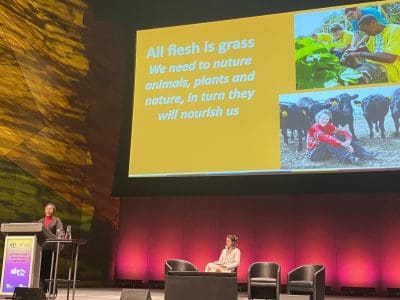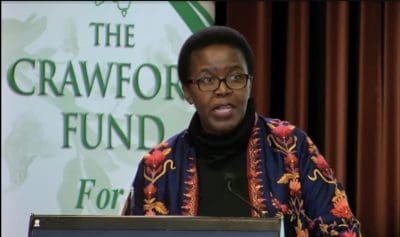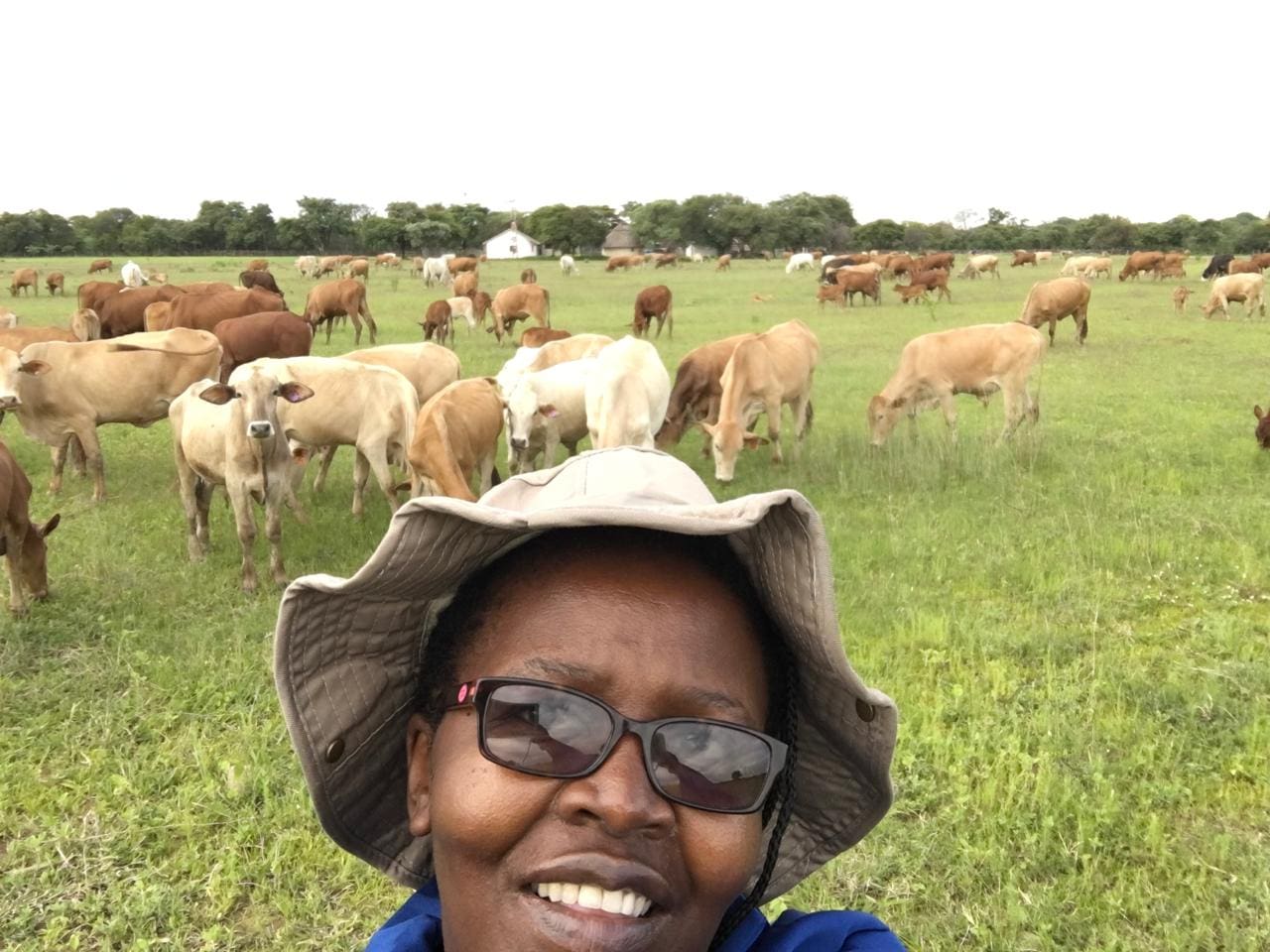
Animal Science Professor and Zimbabwean cattle producer Lindiwe Majele Sibanda is on a mission to disprove the declare farmers don’t care concerning the surroundings.
However she additionally desires folks to grasp that farmers can solely produce high quality meals that “nourishes the physique and nourishes the soil” if they’re economically supported to take action.
Her central message to a current worldwide animal science congress in Melbourne is that livestock are important to the manufacturing of extremely nutritious meals and that science has a serious function to play in strengthening the resilience of livestock meals techniques from farm to fork.
Professor Sibanda has a PhD in animal vitamin and an MSc in Agriculture Grassland Science and has bred cattle on a 600-hectare farm close to Harare for the previous 27 years (extra on her personal cattle farming story beneath).
She is an Extraordinary Professor on the College of Pretoria, South Africa, serves as a coverage advisor to quite a few African governments and world establishments, and, amongst quite a few worldwide management roles, she is chair of the One CGIAR System Board (Consultative Group on Worldwide Agricultural Analysis) and has beforehand chaired the Worldwide Livestock Analysis Establishment (ILRI).
On her current go to to Australia Professor Sibanda shared with Beef Central a number of insights about what life is like for modern-day small holder cattle farmers like herself in Africa.
She stated the world has forgotten concerning the significance of soil and wishes livestock techniques to revive the manufacturing of extremely nutritious meals, however farmers face a serious problem to take action in an surroundings of rising prices and diminishing returns.
All flesh is grass
Professor Sibanda was in Australiain July to ship the keynote deal with to the joint Congress for the Australian Affiliation of Animal Science (AAAS) and the Asian-Australasian Affiliation of Animal Manufacturing (AAAP), an deal with given yearly in honour of Gordon “Invoice” McClymont, an Australian agricultural scientist, farmer, educator who’s revered as a father of sustainable agriculture.
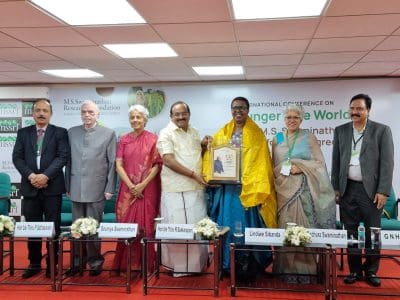
Two weeks in the past on August 7 Professor Sibanda was awarded the celebrated MS Swaminathan World Management Award 2024 in Chennai, India, which recognises people who make extraordinary contributions to sustainable improvement, significantly in agriculture.
Professor Sibanda stated she was privileged to be requested to ship the McClymont lecture, describing the late Professor as “one among Australia’s finest stored secrets and techniques” and “a person I’d like to have had as a mentor at the moment”.
Gordon McClymont was famend for sharing the phrase “All Flesh is Grass”, which he tailored from a bible passage to convey the common significance of soil high quality to all life and all livelihoods on earth.
In launching a level program on the College of New England in Armidale in 1955, Professor McClymont stated: “The financial well being of this nation, and so the usual of civilization which it’ll assist, rests on the fertility of its soils and on the resultant productiveness of its pastures, livestock and crops.”
“His credo was All Flesh is Grass – every part we produce comes from nature,” Lindiwe stated in an interview with Beef Central.
“If we don’t take care of nature, it won’t take care of us.”
It is a lesson she attracts deeply upon from her personal private expertise.
“I imagine the very first thing now we have to demystify is the truth that farmers don’t care concerning the surroundings.
“They care.
“I keep in mind my grandmother on her one-hectare plot.
“She had about 10 numerous crops, she had goats, she had free ranging chickens.
“Her goal in farming was to feed her household, feed the soil, and feed her pocket with some earnings.
“She performed that steadiness very properly.”
Nevertheless, the inexperienced revolution and mono-cropping had led to the decline of many indigenous crops – so-called female crops or subsistence crops – which had been deemed to have little financial worth, she stated.
(A lot of the feminine crops have now develop into “alternative crops” due to their vitamin and resilience to local weather change, Professor Sibanda additional defined).
And because of this, “we forgot concerning the soil”.
“We had maize, maize, maize, maize for over 10 years as a result of that’s the place the cash was, however we then neglect that we would want cash for fertiliser, and the soil wanted natural matter.
“Over time nobody had cattle or a blended manufacturing system the place you get the manure to fertilise your soil.
“All people relies on chemical fertilisers, and now we have mined the soils.”
African farmers face spiralling prices and collapsing returns
Local weather change has triggered a shift from structured moist and dry seasons from her childhood to extra erratic rainfall patterns which in flip have introduced new and extra complicated illness challenges, Professor Sibanda stated.
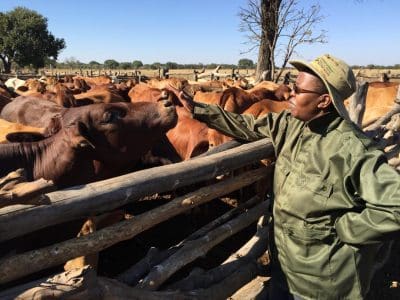 This contains greater tick burdens which require farmers to dip cattle extra typically. On the similar time deteriorating soils and pasture high quality imply farmers should now complement cattle with lick blocks to offer micro-nutrients to be able to preserve herd well being and manufacturing high quality.
This contains greater tick burdens which require farmers to dip cattle extra typically. On the similar time deteriorating soils and pasture high quality imply farmers should now complement cattle with lick blocks to offer micro-nutrients to be able to preserve herd well being and manufacturing high quality.
These elements had been driving manufacturing prices greater, however over the identical interval their incomes had been collapsing.
The value Professor Sibanda receives for her cattle at the moment is sort of one third of the worth she obtained 5 years in the past.
“The intermediary, and the man on the finish, the butcher, is making all of the income at my expense,” she defined.
“One thing has gone incorrect within the worth chain; the farmer is now the least rewarded in that chain.”
Critical implications for dietary high quality of meals
This had severe implications for the dietary high quality of meals she stated.
Treating meals as a commodity had led to a lack of nutrient density and an increase in malnutrition with minimal micronutrients within the cereals of the grains and meals farmers produce on their farms.
“The following is the soil, it constantly must be fed at a sooner fee as a result of now we have leached out all of the vitamins.”
Gene banks will allow farmers to supply “a various pantry”
Professor Sibanda is a number one advocate and prime mover of “Vision for Adapted for Crops and Soils” – or VACS – a worldwide initiative to replant indigenous seeds saved in gene banks and resurrect conventional, nutrient wealthy crops that aren’t solely local weather resilient, however which additionally improve the standard of the meals on the buyer’s plate.
“Pull out these seeds that we had left behind and we will now breed them for sustainable meals techniques.
“It’s the duty of the farmers to supply a various pantry”.
“We can not try this the place we’re solely producing these crops which have a industrial worth however should not nourishing the planet, and the physique.”
Genetics as an answer
She additionally advocates breeding animals which can be local weather resilient and tailored to the native surroundings.
“We need to be accountable producers. You need to produce for financial acquire, however you additionally need to produce for the social advantages and the environmental advantages.
“These three are the crux of what farmers are attempting to attain – financial, social and environmental acquire.
“How can we ship science that ensures now we have proper amount, proper high quality, and can safeguard our planet? That’s the large problem.”
Her personal cattle farming expertise
After graduating with a PhD in animal science, Professor Sibanda began her personal farming operation by leasing a 600-hectare farm simply outdoors Harare.
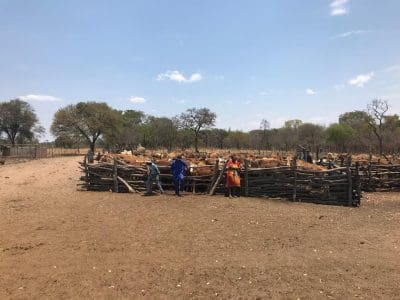 “It was on a rent-to-buy foundation, and my concept was actually to return and produce significantly meat – I all the time felt that the one piece of meat my grandmother fed me, lower than 40 grams, was not sufficient – and I felt that if we may develop extra meat, I’d have meat on daily basis.”
“It was on a rent-to-buy foundation, and my concept was actually to return and produce significantly meat – I all the time felt that the one piece of meat my grandmother fed me, lower than 40 grams, was not sufficient – and I felt that if we may develop extra meat, I’d have meat on daily basis.”
Regardless of having a PhD in animal science, she stated her training had nonetheless not ready her to develop into a farmer, so she realized from her neighbours.
“And to today that is nonetheless one of the simplest ways farmers study – farmer to farmer,” she stated.
She began with a base herd of indigenous Tuli cattle.
“My dad suggested me that the perfect base is the normal, as a result of they’re endemic to the world, they usually gained’t have as many ailments, and their vitamin is customized to the rangelands the place they get that grazing from, and they’ll actually require minimal administration when it comes to ailments, vitamin, and fundamental administration.
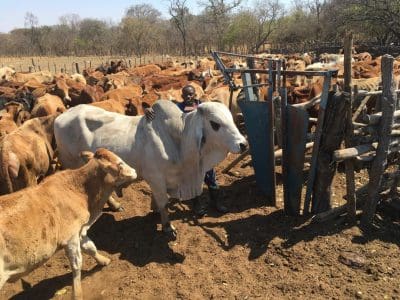 “In order that did very properly, however after about 12 years, I discovered that the progeny was getting shorter and fewer beefy, so I made a decision to cross with an unique Brahman. That did properly for a few years, however then I began getting attacked by new ailments.
“In order that did very properly, however after about 12 years, I discovered that the progeny was getting shorter and fewer beefy, so I made a decision to cross with an unique Brahman. That did properly for a few years, however then I began getting attacked by new ailments.
“I needed to vaccinate extra, I needed to de-tick and dip extra typically and that elevated my prices.
“Somebody suggested me to enter one other breed, BeefMaster, to do what breeders name a three-way cross.
“Nicely, that labored for about three or 4 years, however I discovered with local weather change at its peak, we had been getting all types of humorous ailments, and we needed to intensify our enter when it comes to well being management.
“Then a giant drought struck, about 4 years in the past we had no water, and I realized my lesson.
“There may be nothing as painful as seeing cattle come pushing your fence in as a result of they will see water contained in the homestead and their water provide is rationed.
“So I destocked to a minimal quantity, from about 400 head I lowered that to one thing I assumed was manageable to simply 100.”
She stated the primary problem now’s the minimal value she receives for cattle, now solely about 30 p.c of what she used to obtain 5 years in the past.
Coverage and expertise options “have to be reasonably priced”
“We’ve to generate new options,” she stated.
“First now we have to generate applied sciences which can be reasonably priced each when it comes to vitamin, when it comes to breeding, when it comes to working with the animal’s microbiome in order that we produce for effectivity, excessive productiveness however in an environment friendly method.
“Second, now we have to play with the coverage – Coverage makers have to guarantee that the applied sciences which can be on the desk are accessible and reasonably priced.
“There isn’t any level producing an excellent additive that animals can devour and scale back their greenhouse gases, if it will enhance the price of manufacturing to the farmer.
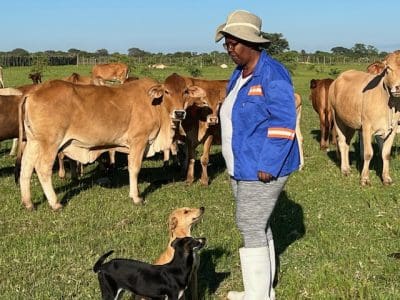 “So let’s decrease the manufacturing value by making a conducive coverage surroundings that promotes reasonably priced, environmentally pleasant, effectivity positive aspects for the farmer, and alongside the worth chain.”
“So let’s decrease the manufacturing value by making a conducive coverage surroundings that promotes reasonably priced, environmentally pleasant, effectivity positive aspects for the farmer, and alongside the worth chain.”
Most markets in southern Africa at the moment are flooded with low cost imported meals like fish, hen and pork which had been historically “not our routine meals” she stated.
“Folks at the moment are shopping for for affordability and value.
“And the hazard there may be persons are now not balancing their dietary wants
“What is reasonable is normally poor high quality.
“At farm degree we’re killing our farmers, they’re getting out of farming as a result of the sport simply don’t make sense economically.
“Farming is a enterprise, and farmers need to be accountable stewards of their surroundings if the applied sciences are reasonably priced.”
Trending Merchandise


